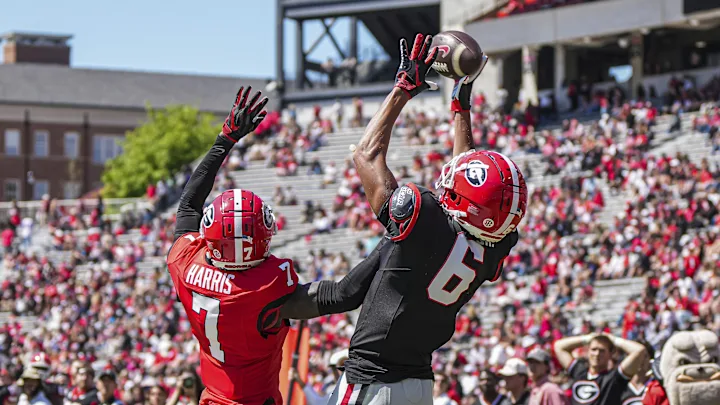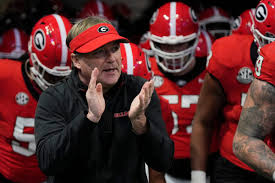Anonymous SEC Coach Believes Georgia Will ‘Decline’ in 2025 College Football Season

Anonymous SEC Coach Believes Georgia Will ‘Decline’ in 2025 College Football Season
In the fiercely competitive landscape of college football, predictions and analyses are abundant, yet few carry the weight of an anonymous SEC coach’s perspective, especially when it revolves around a powerhouse like Georgia. An SEC coach, speaking under anonymity, has recently expressed a belief that Georgia will experience a decline in the 2025 college football season. This assertion, while speculative, is rooted in a nuanced understanding of the program’s current trajectory, conference dynamics, personnel transitions, and potential challenges ahead. To unpack this perspective thoroughly, we must examine Georgia’s recent dominance, roster turnover, coaching strategies, conference competition, recruiting pipeline, and the broader landscape of college football, all within the context of the 2025 season. Through this comprehensive analysis, we aim to understand the rationale behind such a prediction, evaluate its validity, and explore the potential factors that could contribute to Georgia’s decline, as perceived by this anonymous SEC insider.
**Georgia’s Recent Dominance and the Foundations of Expectation**
Since Kirby Smart’s arrival as Georgia’s head coach in 2016, the Bulldogs have established themselves as a perennial national title contender, capturing back-to-back championships in 2021 and 2022. Their success has been built on a formidable defense, disciplined offense, elite recruiting, and a culture of relentless effort. The 2022 season, in particular, exemplified Georgia’s dominance, with the team finishing with an 15-0 record, a dominant SEC Championship, and a convincing national title victory over TCU. This sustained excellence has elevated Georgia to the top of college football’s hierarchy, with high expectations for continued success.
However, the coach’s assertion that Georgia will decline in 2025 suggests that despite recent achievements, there are significant factors that could undermine their dominance in the upcoming year. Historically, even the most successful programs face challenges, especially during periods of transition or increased competition. The coach’s perspective likely considers these elements, emphasizing that no dynasty remains unchallenged forever.
**Personnel Turnover and Player Departures**
One of the most critical factors influencing a team’s prospects is roster stability. Georgia’s 2023 and 2024 teams feature a number of key players who have contributed to their recent success, including All-American defenders, star quarterbacks, and playmakers on both sides of the ball. By 2025, a significant portion of these players will graduate or declare for the NFL draft, leading to a potential talent gap.
The college football landscape is characterized by rapid roster turnover driven by early NFL entries, transfer portal activity, and graduations. Georgia’s current roster is loaded with talented underclassmen, but the transition to a new core can be challenging. For instance, if Georgia’s quarterback position sees a change—such as a highly touted recruit or a rising star taking over—the team’s offensive consistency could be impacted. Similarly, losing key defenders or offensive linemen to the draft or transfers could weaken a unit that has been a cornerstone of their success.
The coach’s skepticism likely stems from concerns about whether Georgia’s incoming recruits can immediately fill the void left by departing stars. While Kirby Smart’s program has a proven track record of recruiting at a high level, the leap from high school to college, especially at a program with national championship expectations, is significant. The adjustment period, combined with the pressure of replacing established stars, could temporarily hinder Georgia’s performance in 2025.
**Strength of Conference Competition and SEC Dynamics**
The SEC has evolved into a battleground of elite programs, each vying for supremacy. Alabama remains a perennial contender, LSU has reemerged as a powerhouse, and teams like Texas A&M, Auburn, and Florida are investing heavily to close the gap. Additionally, rivalries such as Alabama-Georgia and LSU-Georgia continue to intensify.
The anonymous coach’s prediction of decline might factor in the increasing depth and talent across the SEC. While Georgia’s defense has been historically stout, opponents are continually scheming to exploit vulnerabilities, especially as offensive schemes become more sophisticated and diverse. For instance, innovative offenses in the conference may pose new challenges to Georgia’s traditionally dominant defense.
Moreover, the coach may believe that other SEC programs are improving more rapidly, reducing Georgia’s comparative advantage. If teams like Alabama or LSU develop more dynamic offenses or improve their defenses, Georgia could find it more difficult to achieve the same level of dominance they enjoyed in recent seasons. The SEC’s competitiveness drives every team to evolve, and a decline for Georgia might occur if they can’t keep pace with this arms race.
**Coaching Staff Transitions and Strategic Adjustments**
Program stability at the coaching level is crucial for sustained success. While Kirby Smart has been a stabilizing figure at Georgia, coaching staff changes, especially on offense or defense, can impact team performance. If, for example, Georgia experiences significant staff turnover—such as a new offensive coordinator or defensive coordinator—there could be growing pains as new systems are implemented.
Furthermore, the coach’s prediction might consider the possibility of strategic shifts in college football that could disadvantage Georgia’s current approach. For instance, if the NCAA or SEC enacts new rules or if the evolving style of play emphasizes different skill sets—such as more spread or tempo-based offenses—Georgia’s traditional strengths may need adjustment. Failure to adapt quickly could lead to a temporary decline in competitiveness.
**Recruiting Challenges and Future Class Impact**
While Georgia has been a recruiting juggernaut, the recruiting landscape is highly competitive. Top programs constantly battle for the most talented prospects, and shifts in recruiting trends or coaching staff can influence class rankings. If Georgia struggles to secure key recruits in the 2024 and 2025 classes, or if they lose out on critical positional targets, their depth and talent level could be compromised.
Furthermore, the transfer portal has become a double-edged sword. While Georgia has successfully added transfers to bolster their roster, losing key players to other programs or failing to replace departing talent adequately could impact team performance. The coach’s skepticism may stem from concerns about the quality and readiness of Georgia’s incoming class and transfers to step into significant roles in 2025.
**Injuries and Variability in Player Health**
Injuries are inevitable in football, and a season heavily impacted by key injuries can derail even the most talented teams. If Georgia faces a spate of injuries to critical starters—such as their quarterback, top defenders, or offensive linemen—their ability to maintain their high level of play could be compromised.
The coach might foresee a scenario where injuries, combined with the natural attrition of a roster, hinder Georgia’s consistency and performance in 2025, leading to a decline relative to their recent standards.
**Evolution of College Football and External Factors**
College football is continuously evolving, influenced by rule changes, transfer policies, NIL (Name, Image, Likeness) opportunities, and the playoff landscape. These external factors can influence team success, recruitment, and competitive balance.
For instance, if other programs leverage NIL more effectively or if the playoff expansion dilutes the strength of Georgia’s schedule, their national standing could diminish. The anonymous coach might believe that Georgia’s current dominance is, in part, a product of the current environment, which could shift unfavorably in 2025.
**Psychological and Cultural Elements**
Sustaining a winning culture requires innovation, motivation, and resilience. The coach might argue that after multiple seasons of winning, complacency could set in, or that opponents will be more motivated to dethrone Georgia. Additionally, internal team dynamics, injuries, or off-field issues could impact morale and focus.
If Georgia’s players and coaching staff do not adapt and evolve, their competitive edge could erode, leading to a decline in results.
**Historical Precedents and Dynasty Fatigue**
Historically, even dominant programs experience cycles of success and decline. The coach may be drawing parallels to previous dynasties that eventually faded due to roster turnover, coaching changes, or increased competition. Recognizing these patterns, he predicts that Georgia’s recent dominance may be short-lived, with 2025 marking the beginning of a decline.
**Conclusion: Weighing the Coach’s Perspective**
In sum, the anonymous SEC coach’s belief that Georgia will decline in 2025 is rooted in a comprehensive understanding of the program’s current strengths and vulnerabilities, the highly competitive SEC environment, the natural cycle of roster turnover, and external factors influencing college football. While Georgia has established itself as a powerhouse, the coach’s perspective underscores that sustained success requires continual adaptation, recruiting excellence, player development, and strategic innovation. Recognizing these challenges, his prediction serves as a reminder that even the most dominant programs must navigate inevitable obstacles, and that a decline—while not guaranteed—is a real possibility if certain factors do not align favorably in 2025. As the season approaches, observers will be watching closely to see if Georgia can defy these concerns and maintain its elite status or if the coach’s forecast proves prescient.









